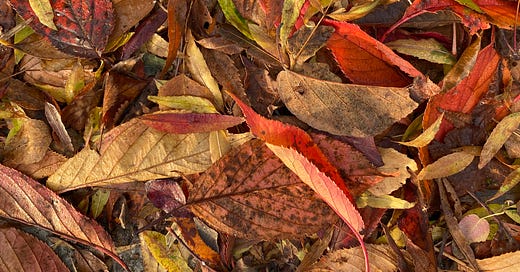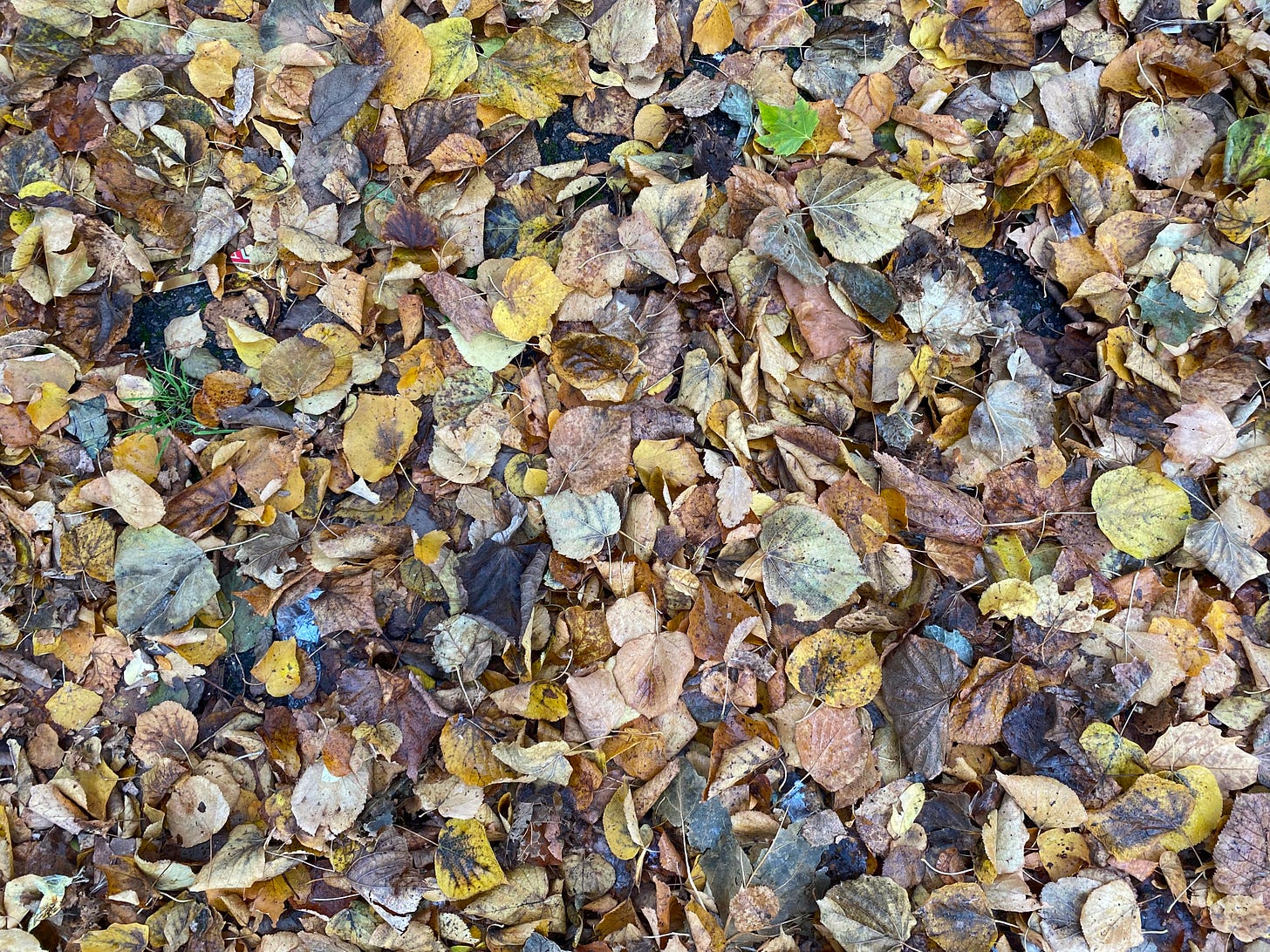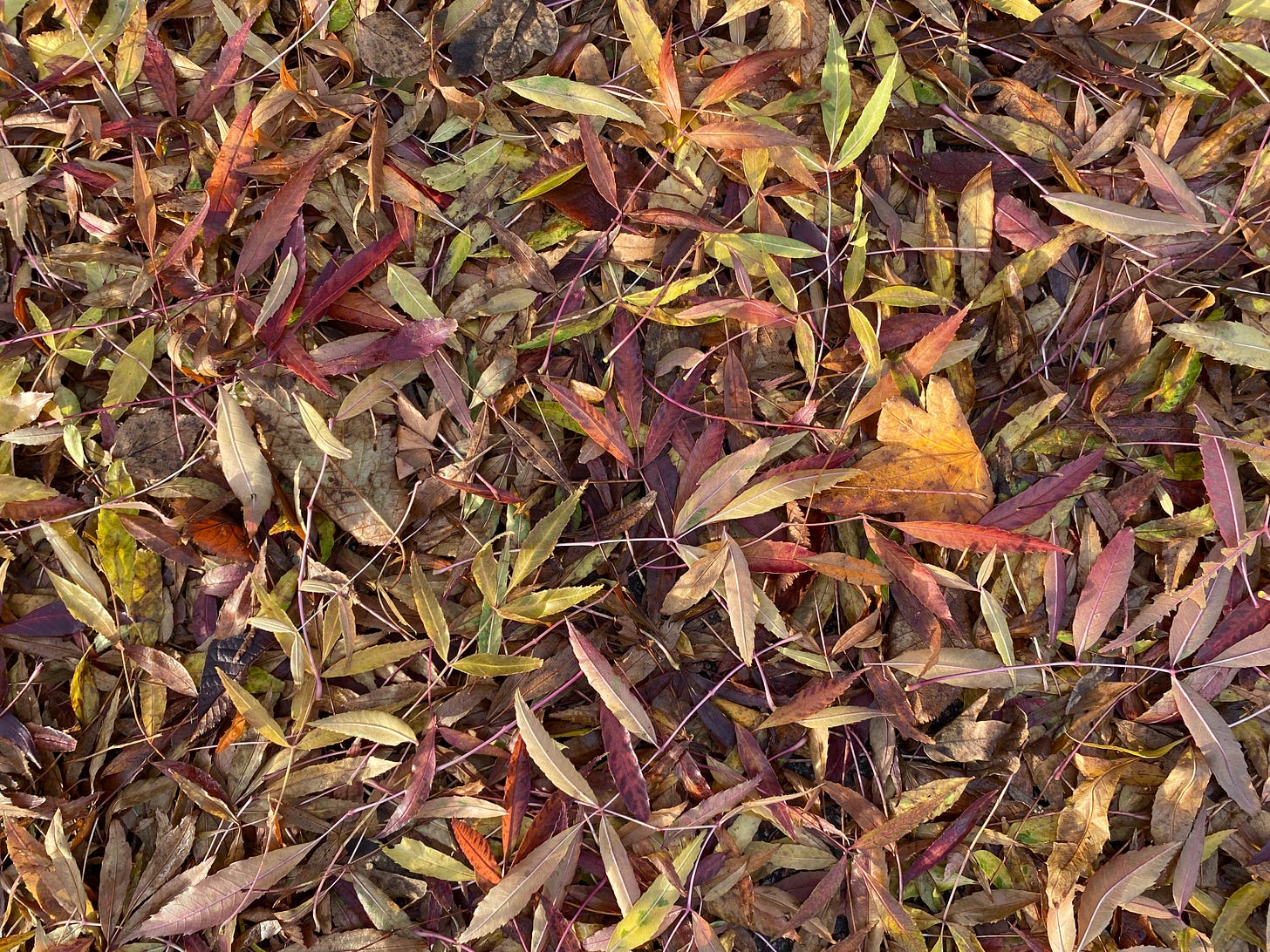Hey, gardener, leave those leaves alone!
Our crazy autumnal obsession with tidying up after trees
Hi, I’m Dan, and this is my alternative gardening newsletter. Whether you’re a first-time reader or a long-time subscriber, thanks for being here. The Earthworm is a reader-supported publication. The two best ways you can support my work are to share this newsletter with a friend, and to consider upgrading to a paid subscription. Thanks for reading.
It is the year AD 40. We find ourselves on a stony beach on the northern shores of Gaul (modern-day France). If you shield your eyes from the sun reflecting off the sea’s surface and squint at the horizon, you can just about make out the faint, hazy outline of Britain’s famous chalky southern cliffs.
The Emperor Caligula – who will later come to be remembered as one of the Roman Empire’s maddest and most depraved leaders – orders his war-weary troops to line up at the water’s edge. Infantrymen, cavalry, artillery, all armed and ready for battle.
After a long campaign, fighting their way up through Gaul, these soldiers could do without the invasion of Britain which surely awaits. Then again, where are the ships? Why are they in battle formation? Where is the enemy?
Marching to the front of the line, the Emperor raises his sword to the waves and bellows a proclamation of war, not against the Celts across the Channel, but against Neptune himself, the God of the Ocean. Slashing at the frothy surf, splashing himself with salty spray, Caligula turns to his dumbfounded troops and declares a resounding victory.
The triumphant soldiers are made to collect seashells as spoils of war, and carry them home to Rome. The war is won.
I love that story. Modern day historians question whether it ever truly happened (the classical sources that speak of it were written many decades after Caligula’s death, by men who enjoyed raking the Emperor's name through the mud). Others, on the assumption that these events did take place, have offered a number of theories as to the purpose of this war on Neptune. They range from sheer lunacy through to more sober explanations, such as Caligula knowing that he did not have the means for a successful British invasion, and would therefore need some other prize to show the Senate for his long and expensive northern campaign.
Whatever the truth of it, the image of the world’s most powerful man stomping about in the shallows while the entirety of his amassed army gazes on in bemusement is just brilliantly bonkers. And that of course is why his opponents, and later people with no connection to the man whatsoever, have told and retold the tale, decades and now millennia after his death. Because what better way to prove someone’s crazed depravity and lost grip on reality than the image of them conducting the most futile and unwinnable war imaginable, and then having the absence of mind to declare themself the victor.
I am reminded of this story often at this time of year. Namely, every time I see someone – ear-defenders on, goggles down – wielding a leaf blower. The image of a person fighting back the matting of autumn leaves at their feet, while reinforcements continue to parachute gently down from the canopy above, is the perfect picture for me of our species’ continued insistence on trying to assert control over nature, even when doing so is at best futile, and at worst counterproductive.
As if we didn’t have enough else going on in our lives, enough other tasks to be getting on with in the garden, we are obsessed with this bizarre and pointless practice, of tidying up fallen leaves. I spend enough time in any given week on my hands and knees, picking scraps of food off the floor that have been tossed – usually accidentally, sometimes deliberately – by my toddler son, from his stilted seat up on his high chair. The last thing I need is to clear up after my trees, too.
I have written before about how I became a messy gardener, and why I believe that more people should do the same. Well, autumn is the messy gardener’s time to shine! This is when I most enjoy sitting back, steaming cup of tea in hand, observing the layer of gold and crimson, purple, pink, orange and brown that is beginning to smatter every visible surface, and doing absolutely nothing at all about it.
Our insistence on blowing, raking, or otherwise gathering fallen leaves into big piles, then disposing of them, is easily as loopy as Caligula stabbing at the sea with his sword. Not just because it is an unwinnable battle, but because it is a battle that we shouldn’t want to win in the first place.
How fickle, how ungrateful of us to welcome the unfurling of the first buds in Spring, enjoy the leaves’ dappled shade during summer, snap photos of their fiery fall colours, only then to scornfully sweep them up now, cursing them for sullying our borders or trespassing on our dormant lawns.
In fact, even in their crusty, lifeless state, these fallen leaves are working just as hard and providing just as much value to the ecosystems around them as they did when they were gracing the branches up above.
For starters, ex-leaves eventually become a gorgeous soil conditioner. It’s not that the leaves themselves, by the time they have fallen from the tree and broken down, are nutritionally rich – they are not, which is why leafmould is such an excellent medium in which to germinate seeds – but they do aid the structure of your soil no end. This improves drainage, creates essential air pockets, and generally enables roots more readily to access the nutrients which are present in the soil around them.
If looking at browning leaves really bothers you, you can gather them together, bag them up, and store them in a cool corner, out of the way for a year, by which time they will have turned into a lovely leafmould which you can sprinkle over your beds.1 And if you don’t mind the mess, then just leave them where they fall and let the worms do all the work.
This way, you’ll be getting a lovely mulch – free of charge! – and one that provides shelter for a whole gamut of species of all shapes and sizes. During the harsh winter months, leaf litter2 provides essential food and/or habitat to everything from frogs, toads and newts to rodents and butterflies, birds and bees.
It’s all very well introducing pollinator-friendly perennials into your garden, but if you disturb, dispose of, or worse still shred the same pollinators’ winter residence, don’t be surprised if your outdoor space isn’t exactly buzzing come the spring.
Clearly a fallen leaf in the wrong place – such as clogging up a drain, or as a slip hazard on a patio – must be dealt with. But maybe we need to reassess what exactly we mean by the “wrong place”, and how precisely we deal with them.
And if you are going to arm yourself with a leaf blower, to do battle with the vast legions of leaves attacking your garden, then all I ask of you is this: wear a toga while you’re at it. It’ll really complete the look.
How do you feel about fallen leaves? Are you a compulsive tidier? Or do you adopt more of a laissez-fall approach?
You can find lots more info on how to use leaves in your garden on the latest Floricult newsletter – Lauren Dubinsky's excellent Substack.
The fact that we use the phrase "leaf litter" to describe fallen leaves shows precisely how much we value their role in the circle of life...







Love your writing, especially the anecdote about Caligula. But the leaves...um, nope. Last year I tried leaving all the leaves in my woodland garden, densely planted with hostas, rhodos, & hydrangeas, because, you know, garden writers. Come spring, the leaves had decomposed not a whit, but instead had formed a dense, wet, 5-inch thick mat, keeping out oxygen, warmth, and light, so that what would have normally been the spears and sprigs of emerging perennials were white, curled alien plants among anoxic loving molds and fungi. If anything overwintered in this mess, it was a bumper crop of slugs, which I spent all summer trying to eradicate with slug baits. I spent my spring, instead of enjoying spring bulbs and new growth, raking and bagging a ton of sodden leaves. This fall my rake is my best friend.
Great post, Dan!
"Clearly a fallen leaf in the wrong place – such as clogging up a drain, or as a slip hazard on a patio – must be dealt with." I was dealing with exactly this at the front of our house this afternoon - we've learned the hard way about flooding!
At the same time I was NOT regretting not raking up the leaves in the back garden. They're looking absolutely beautiful. They can wait until the next dry spell, when I sweep them up before I give the grass a cut.